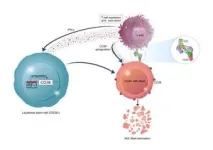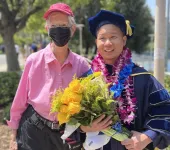(Press-News.org) DETROIT – A team of researchers from Wayne State University and the Barbara Ann Karmanos Cancer Institute has received a five-year, $9.6 million grant from the National Cancer Institute of the National Institutes of Health for the study “Genetic Variation in Cancer Risk and Outcomes in African Americans.” This is a Program Project Grant that includes three large studies. The team will work to improve the identification and clinical management of hereditary and multiple primary cancers in African Americans, a population that is currently underrepresented in genetic research.
According to Ann Schwartz, Ph.D., principal investigator of the project, professor and associate chair of oncology at the Wayne State University School of Medicine, and vice president and deputy director of research and academic affairs at the Barbara Ann Karmanos Cancer Institute, genetic testing has identified high-risk populations for targeted prevention and screening, identified targets for new treatment strategies, and has led to some of the most significant inroads in reducing cancer burden. Jennifer Beebe-Dimmer, Ph.D., is the co-principal investigator on this award and is a professor of oncology at Wayne State University School of Medicine and leader of the Population Studies and Disparities Research Program at Karmanos Cancer Institute.
"We have assembled one of the largest populations of African American cancer survivors to date in a study called Detroit Research on Cancer Survivors – or ROCS – to now study genetic susceptibility and genetic testing in this population,” said Schwartz. “Our overall goal for this new project is to improve the identification and clinical management of hereditary and multiple primary cancers in African Americans.”
While genetic testing to date has made a great impact on identifying high-risk populations for targeted prevention, screening and treatment strategies, there is still much to learn about the role of inherited genetic susceptibility and cancer, especially in underrepresented populations. To date, most genetic studies have been conducted in largely non-Hispanic white populations with uncertain applicability to minority populations, limiting strides in early diagnosis and treatment that can result in increasing disparities in cancer incidence and mortality.
“While a number of penetrant cancer-susceptibility genes have been identified in African Americans, there is still a need to expand clinical testing in minority populations,” said Schwartz. Kristen Purrington, Ph.D., MPH, WSU and Karmanos, and Elena Stoffel, M.D., MPH, University of Michigan, are leading a project to better understand contributions from variants of uncertain clinical significance that occur in the high-risk African American population.
Beebe-Dimmer and Kathleen Cooney, M.D., Duke University, are leading a project to identify risk factors for multiple primary cancers.
According to Beebe-Dimmer, “If we can identify potentially modifiable risk factors that can partially mitigate genetic risk related to highly penetrant variants and understand their relationship to more common variants of low-penetrance, we may provide a pathway to improve cancer screening and prevention.”
While the current genetic knowledge has improved over time, there are still significant barriers to accessing genetic counseling and testing services among African Americans. The third project, led by Felicity Harper, Ph.D., and Hayley Thompson, Ph.D., both at Wayne State University and Karmanos, will lead to novel strategies to improve genetic testing in this population.
“This work has the potential to be game-changing for the African American community – who is often left out of cutting-edge cancer research,” said Ezemenari M. Obasi, Ph.D., vice president for research at Wayne State University. “By developing novel strategies to overcome barriers to testing, Drs. Schwartz and Beebe-Dimmer and their team will make great strides in reducing cancer burden and health disparities.”
The grant number for this National Cancer Institute of the National Institutes of Health grant is NCI P01CA272239.
###
About Wayne State University
Wayne State University is one of the nation’s pre-eminent public research universities in an urban setting. Through its multidisciplinary approach to research and education, and its ongoing collaboration with government, industry and other institutions, the university seeks to enhance economic growth and improve the quality of life in the city of Detroit, state of Michigan and throughout the world. For more information about research at Wayne State University, visit research.wayne.edu.
About the Barbara Ann Karmanos Cancer Institute
Karmanos Cancer Institute is a leader in transformative cancer care, research and education through courage, commitment and compassion. The Karmanos vision is a world free of cancer. As part of McLaren Health Care, Karmanos is the largest provider of cancer care and research in Michigan. For more than 75 years, the administrative and research headquarters, along with the premier specialty cancer hospital, have been located in downtown Detroit. With 16 network sites, Karmanos delivers world-renowned care and access to clinical trials throughout Michigan and northern Ohio. The National Cancer Institute recognizes Karmanos as one of the best cancer centers in the nation with a comprehensive cancer center designation. Its academic partnership with the Wayne State University School of Medicine provides the framework for cancer research and education – defining new standards of care and improving survivorship. For more information, call 1-800-KARMANOS (800-527-6266) or visit www.karmanos.org. Follow Karmanos on Facebook, Twitter, LinkedIn and YouTube.
END
Detroit research team to develop novel strategies to identify genetic contributions to cancer risk and overcome barriers to genetic testing for African Americans
The largest cohort of African American cancer survivors is key to this study
2024-02-26
ELSE PRESS RELEASES FROM THIS DATE:
Vaping can increase susceptibility to infection by SARS-CoV-2
2024-02-26
RIVERSIDE, Calif. -- Vapers are susceptible to infection by SARS-CoV-2, the virus that spreads COVID-19 and continues to infect people around the world, a University of California, Riverside, study has found.
The liquid used in electronic cigarettes, called e-liquid, typically contains nicotine, propylene glycol, vegetable glycerin, and flavor chemicals. The researchers found propylene glycol/vegetable glycerin alone or along with nicotine enhanced COVID-19 infection through different mechanisms.
Study results appear in the American Journal of Physiology.
The researchers ...
Dissecting the roles for excitatory and inhibitory neurons in STXBP1 encephalopathy
2024-02-26
A recent study from Baylor College of Medicine and Texas Children’s Hospital has discovered inhibitory and excitatory neurons play distinct roles in the pathogenesis of STXBP1 encephalopathy, one of the top five causes of pediatric epilepsies and among the most frequent causes of neurodevelopmental disorders. This early-onset disorder is caused by spontaneous mutations in the syntaxin-binding protein 1 (STXBP1) gene. While STXBP1 gene variants impair both excitatory and inhibitory neurotransmission, this study led by Dr. Mingshan Xue, associate professor at Baylor and principal investigator at the Jan and Dan Duncan Neurological Research Institute (Duncan ...
Boston College biologist awarded $2.5-million NIH grant to explore the role of viral insulins and potential applications to cancers
2024-02-26
Chestnut Hill, Mass (2/26/2024) – Boston College Assistant Professor of Biology Emrah Altindis has been awarded a five-year, $2.5-million grant from the National Institutes of Health to study viral insulins and mechanisms related to IGF-1 receptor protein inhibition and its potential applications in cancer treatment.
Altindis said he and the researchers in his lab will use the grant to learn more about how to use specific viral insulins – particularly insulin-like growth factor-1 (IGF-1) – to inhibit IGF-1 receptor action, which is increased in a range ...
New clinical practice guideline provides evidence-based recommendations for immunotherapy for inhalant allergy
2024-02-26
ALEXANDRIA, VA —The American Academy of Otolaryngology–Head and Neck Surgery Foundation published the Clinical Practice Guideline: Immunotherapy for Inhalant Allergy today in Otolaryngology–Head and Neck Surgery. This clinical practice guideline identifies quality improvement opportunities and provides clinicians trustworthy, evidence-based recommendations on the management of inhalant allergies with immunotherapy, supporting them to provide enhanced care to patients aged 5 years and older who are experiencing symptoms from inhalant allergies.
“More ...
SFU-led research team designs a cutting-edge protein lawnmower
2024-02-26
An SFU-led collaboration has designed the first synthetic protein-based motor which harnesses biological reactions to fuel and propel itself.
“Imagine if a Roomba could be powered only by the dirt it picks up,” says SFU Physics professor Nancy Forde, one of the authors of the study.
The team’s paper, led by SFU Physics PhD graduate Chapin Korosec and published today in Nature Communications, describes a protein-based molecular motor called “The Lawnmower,” which has been designed to cut a lawn of peptide “grass.” ...
Metal in glitter impairs aquatic plant growth, study shows
2024-02-26
Glitter is used in a wide array of colors and shapes in apparel, footwear, cosmetics, makeup, handbags, festive decorations, arts and crafts, and jewelry, among many other applications. During the Carnival holidays, hundreds of thousands of Brazilians cover parts of their bodies with it while dancing in the streets. Its brilliance is dazzling but it is considered an emerging pollutant by many scientists: like other microplastics (small plastic pieces less than 5 mm long), it is not filtered by wastewater treatment plants and ends up in rivers and the sea, interfering with aquatic life in various ways.
A study conducted at the Federal University of ...
Scientists assemble a richer picture of the plight and resilience of the foothill yellow-legged frog
2024-02-26
(Santa Barbara, Calif.) — Up to only a few inches in length, with a lemon-hued belly, the foothill yellow-legged frog may seem unassuming. But its range once stretched from central Oregon to Baja California. In 2023, it was listed under the federal Endangered Species Act. Its rapidly decreasing range is due in part to a fungal pathogen called Batrachochytrium dendrobatidis, or Bd, that has devastated amphibians around the world.
A team of researchers, including UC Santa Barbara’s Andrea Adams, has conducted the most comprehensive study to date ...
Neuropsychiatric symptoms predict which patients with mild cognitive impairment develop Alzheimer’s disease.
2024-02-26
As the years add up, it's common to notice slight changes in our ability to remember and think. Older people who have more marked changes than their peers can be diagnosed with mild cognitive impairment (MCI). Currently, we can’t easily predict which of these patients will develop Alzheimer’s disease and which will not.
“It's hard to predict which patients will have a more rapid progression and receive a diagnosis of dementia,” said Maria Vittoria Spampinato, M.D., division director of Neuroradiology at the Medical University of South Carolina.
“It’s important ...
Resurrecting niobium for quantum science
2024-02-26
For years, niobium was considered an underperformer when it came to superconducting qubits. Now scientists supported by Q-NEXT have found a way to engineer a high-performing niobium-based qubit and so take advantage of niobium’s superior qualities.
When it comes to quantum technology, niobium is making a comeback.
For the past 15 years, niobium has been sitting on the bench after experiencing a few mediocre at-bats as a core qubit material.
Qubits are the fundamental components of quantum devices. One qubit type relies on superconductivity to process information.
Touted for its superior qualities as a superconductor, niobium was always a promising ...
Long-term data reveals SARS-CoV-2 infection and vaccine-induced antibody responses are long-lasting
2024-02-26
A long-term analysis conducted by leading microbiologists at the Icahn School of Medicine at Mount Sinai reveals that antibody responses induced by COVID-19 vaccines are long-lasting. The study results, published online in the journal Immunity on February 22, challenge the idea that mRNA-based vaccine immunity wanes quickly.
The emergence of SARS-CoV-2, the virus that causes COVID-19, in late 2019 sparked the global pandemic that is now in its fifth year. Vaccines that were developed at record speed have saved millions of lives. However, the emergence of SARS-CoV-2 variants and waning immunity have decreased ...
LAST 30 PRESS RELEASES:
ASU researchers showcase scalable tech solutions for older adults living alone with cognitive decline at AAAS 2026
Scientists identify smooth regional trends in fruit fly survival strategies
Antipathy toward snakes? Your parents likely talked you into that at an early age
Sylvester Cancer Tip Sheet for Feb. 2026
Online exposure to medical misinformation concentrated among older adults
Telehealth improves access to genetic services for adult survivors of childhood cancers
Outdated mortality benchmarks risk missing early signs of famine and delay recognizing mass starvation
Newly discovered bacterium converts carbon dioxide into chemicals using electricity
Flipping and reversing mini-proteins could improve disease treatment
Scientists reveal major hidden source of atmospheric nitrogen pollution in fragile lake basin
Biochar emerges as a powerful tool for soil carbon neutrality and climate mitigation
Tiny cell messengers show big promise for safer protein and gene delivery
AMS releases statement regarding the decision to rescind EPA’s 2009 Endangerment Finding
Parents’ alcohol and drug use influences their children’s consumption, research shows
Modular assembly of chiral nitrogen-bridged rings achieved by palladium-catalyzed diastereoselective and enantioselective cascade cyclization reactions
Promoting civic engagement
AMS Science Preview: Hurricane slowdown, school snow days
Deforestation in the Amazon raises the surface temperature by 3 °C during the dry season
Model more accurately maps the impact of frost on corn crops
How did humans develop sharp vision? Lab-grown retinas show likely answer
Sour grapes? Taste, experience of sour foods depends on individual consumer
At AAAS, professor Krystal Tsosie argues the future of science must be Indigenous-led
From the lab to the living room: Decoding Parkinson’s patients movements in the real world
Research advances in porous materials, as highlighted in the 2025 Nobel Prize in Chemistry
Sally C. Morton, executive vice president of ASU Knowledge Enterprise, presents a bold and practical framework for moving research from discovery to real-world impact
Biochemical parameters in patients with diabetic nephropathy versus individuals with diabetes alone, non-diabetic nephropathy, and healthy controls
Muscular strength and mortality in women ages 63 to 99
Adolescent and young adult requests for medication abortion through online telemedicine
Researchers want a better whiff of plant-based proteins
Pioneering a new generation of lithium battery cathode materials
[Press-News.org] Detroit research team to develop novel strategies to identify genetic contributions to cancer risk and overcome barriers to genetic testing for African AmericansThe largest cohort of African American cancer survivors is key to this study







